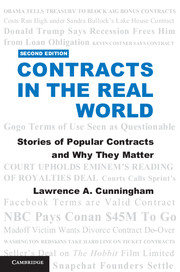Book contents
- Frontmatter
- Dedication
- Contents
- Annotated Contents
- Acknowledgments
- Introduction
- 1 Getting In: Contract Formation
- 2 Facing Limits: Unenforceable Bargains
- 3 Getting Out: Excuses and Termination
- 4 Paying Up: Remedies
- 5 Rewinding: Restitution and Unjust Enrichment
- 6 Writing It Down: Interpretation, Parol, Frauds
- 7 Performing: Duties, Modifi cation, Good Faith
- 8 Hedging: Conditions
- 9 Considering Others: Third Parties and Society
- Conclusion
- Appendix A Offering and Accepting
- Appendix B Buying and Selling Goods
- Notes
- Table of Cases
- Index
Appendix B - Buying and Selling Goods
Published online by Cambridge University Press: 05 March 2016
- Frontmatter
- Dedication
- Contents
- Annotated Contents
- Acknowledgments
- Introduction
- 1 Getting In: Contract Formation
- 2 Facing Limits: Unenforceable Bargains
- 3 Getting Out: Excuses and Termination
- 4 Paying Up: Remedies
- 5 Rewinding: Restitution and Unjust Enrichment
- 6 Writing It Down: Interpretation, Parol, Frauds
- 7 Performing: Duties, Modifi cation, Good Faith
- 8 Hedging: Conditions
- 9 Considering Others: Third Parties and Society
- Conclusion
- Appendix A Offering and Accepting
- Appendix B Buying and Selling Goods
- Notes
- Table of Cases
- Index
Summary
Dee Franklin Kirkendall underwent heart surgery on March 28, 1985, at Sparks Regional Medical Center in Fort Smith, Arkansas. During the procedure, United Blood Services (UBS) provided a blood transfusion using blood that had been donated to it. A month later, when the same donor contributed more blood to UBS, it tested positive for acquired immune deficiency syndrome (AIDS), which UBS subsequently reported to Kirkendall's surgeon. Kirkendall was diagnosed as having AIDS on November 2, 1986, and died on April 23, 1987.
Ann Kirkdendall, his widow, sued UBS, alleging breach of an implied warranty of the blood's merchantability and fitness for transfusion. UBS countered that it had expressed no such warranty and that the common law implies no such warranty. Ann asserted that a special body of contract law, called commercial law and applicable to sales of goods, implies a special warranty covering blood and other goods. But UBS argued that the special commercial rules did not apply because their exchange involved primarily the service of a blood transfusion, not the sale of blood as a good.
The merits therefore depended on how the transaction was classified. If seen as a service, all the principles encountered earlier in this book apply; but if instead the deal was primarily the sale of blood, a good, then a cousin batch of law also applied, called commercial law and codified in Article 2 of the Uniform Commercial Code. While the common law is grand and capacious, commercial lawyers dating back centuries perceived the need for a special set of laws for transactions in goods, and both courts and legislatures obliged by forging a parallel body of law.
It closely resembles the common law of contracts – it contains many of the same concepts and applies to familiar volitional promises and exchanges. In many contexts, the common law and the UCC (as it is often abbreviated) are the same or similar. But in a dozen or so places where the two bodies of law differ, they differ sharply. That often makes classification of the transaction as one involving goods or not outcome determinative – as in the case of the blood transfusion.
Section 2–102 of the UCC opens: “Unless context requires otherwise, this Article applies to transactions in goods,” raising three threshold points. First, what are goods?
- Type
- Chapter
- Information
- Contracts in the Real WorldStories of Popular Contracts and Why They Matter, pp. 247 - 250Publisher: Cambridge University PressPrint publication year: 2016

